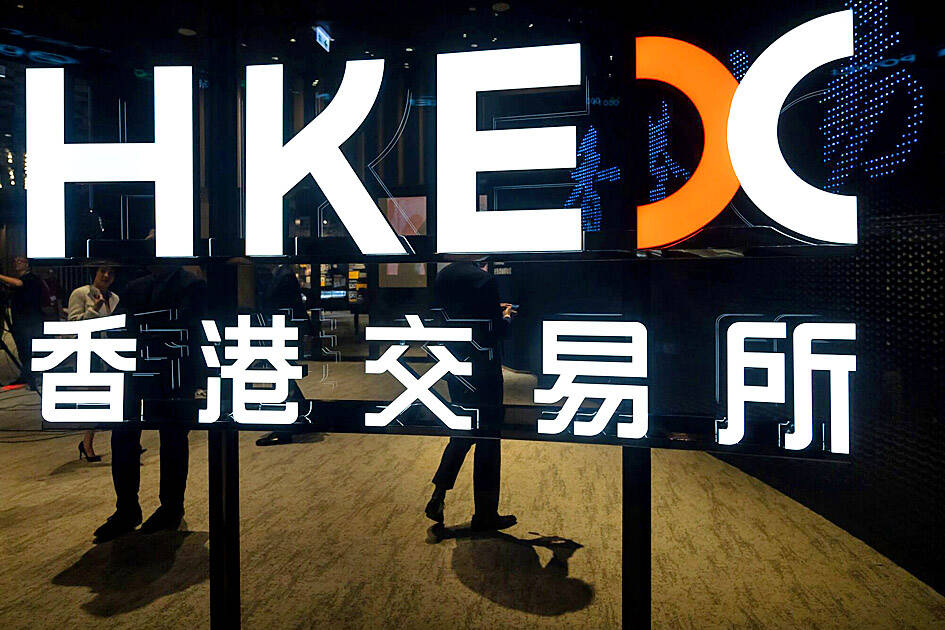Hong Kong’s stock exchange would continue trading through typhoons and heavy storms from September, Hong Kong Chief Executive John Lee (李家超) announced yesterday.
The territory’s bourse typically suspends trading when a strong typhoon signal or “black rainstorm warning” is hoisted, meaning several days are lost each year.
Lee said that from Sept. 23 investors can trade as usual “when the typhoon signal number eight or above is hoisted in Hong Kong, or even during a black rainstorm warning.”

Photo: Bloomberg
“Shenzhen and Shanghai are now trading in bad weather. There is no reason why Hong Kong, as an international financial center, should not follow suit,” he said.
“Non-stop trading in inclement weather can strengthen the competitiveness of the Hong Kong Exchange,” he said, adding that the September time frame would give the industry time to prepare.
Hong Kong Securities Association chaireoman Katerine Kou (高鵑) said discussions on the move had continued for a year given the territory’s role as “a super connector between the Chinese market and the global market.”
“I think Hong Kong as a whole, including the exchange, has been trying to score more points and to enhance its global competitiveness,” Kou said. “This is definitely a score-winning move.”
Last year, the territory raised its highest “T10 warning — for Typhoon Saola — for only the 16th time since World War II. A week after Saola, Hong Kong was flooded by the heaviest rainfall in nearly 140 years, leaving its streets inundated and subway stations waterlogged.
According to a consultation paper from the city’s bourse proposing trading continue through bad weather, the exchange was affected by severe weather four times last year, “including three full-day market suspensions.”

Intel Corp chief executive officer Lip-Bu Tan (陳立武) is expected to meet with Taiwanese suppliers next month in conjunction with the opening of the Computex Taipei trade show, supply chain sources said on Monday. The visit, the first for Tan to Taiwan since assuming his new post last month, would be aimed at enhancing Intel’s ties with suppliers in Taiwan as he attempts to help turn around the struggling US chipmaker, the sources said. Tan is to hold a banquet to celebrate Intel’s 40-year presence in Taiwan before Computex opens on May 20 and invite dozens of Taiwanese suppliers to exchange views

Application-specific integrated circuit designer Faraday Technology Corp (智原) yesterday said that although revenue this quarter would decline 30 percent from last quarter, it retained its full-year forecast of revenue growth of 100 percent. The company attributed the quarterly drop to a slowdown in customers’ production of chips using Faraday’s advanced packaging technology. The company is still confident about its revenue growth this year, given its strong “design-win” — or the projects it won to help customers design their chips, Faraday president Steve Wang (王國雍) told an online earnings conference. “The design-win this year is better than we expected. We believe we will win

Power supply and electronic components maker Delta Electronics Inc (台達電) yesterday said it plans to ship its new 1 megawatt charging systems for electric trucks and buses in the first half of next year at the earliest. The new charging piles, which deliver up to 1 megawatt of charging power, are designed for heavy-duty electric vehicles, and support a maximum current of 1,500 amperes and output of 1,250 volts, Delta said in a news release. “If everything goes smoothly, we could begin shipping those new charging systems as early as in the first half of next year,” a company official said. The new

Quanta Computer Inc (廣達) chairman Barry Lam (林百里) is expected to share his views about the artificial intelligence (AI) industry’s prospects during his speech at the company’s 37th anniversary ceremony, as AI servers have become a new growth engine for the equipment manufacturing service provider. Lam’s speech is much anticipated, as Quanta has risen as one of the world’s major AI server suppliers. The company reported a 30 percent year-on-year growth in consolidated revenue to NT$1.41 trillion (US$43.35 billion) last year, thanks to fast-growing demand for servers, especially those with AI capabilities. The company told investors in November last year that